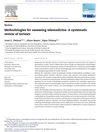
Researchers identified 1593 titles/abstracts and included 50 reviews that explicitly addressed assessment methodologies. One group of reviews recommended larger and more rigorously designed controlled studies to assess the impacts of telemedicine; a second group proposed standardisation of populations, and/or interventions and outcome measures to reduce heterogeneity and facilitate meta-analysis; a third group recommended combining quantitative and qualitative research methods; and others applying different naturalistic approaches including methodologies addressing mutual adaptations of services and users; politically driven action research and formative research aimed at collaboration to ensure capacity for improvement of services in natural settings.
Download Methodologies for Assessing Telemedicine: A Systematic Review of Reviews (.pdf, 483 KB).